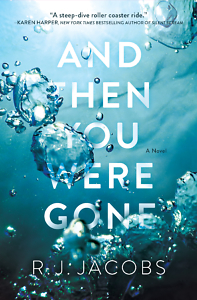Secret Lives
Mania meets narcissism—and murder—in R.J. Jacobs’s debut thriller
Even the most seemingly intimate relationships can be tragically undermined by psychological traits that conspire to keep people from truly knowing one another. That’s but one of the takeaways from R.J. Jacobs’s masterfully layered debut mystery, And Then You Were Gone.

Fully a year into their romance, Paolo, a lab researcher at Vanderbilt Medical Center searching for a cure for the H1-N24 flu virus, has no idea that his girlfriend, a child psychologist, can’t swim and is utterly terrified of water. Emily Firestone has vivid childhood recollections of her grandmother trying every summer to commit suicide by drowning. But Emily is so in love with Paolo that she agrees to go on a romantic weekend boating trip with him despite her almost paralyzing fear.
It’s not until he starts the engine and motors away from the dock that Emily tells him she can’t swim, the first clue from the author, who is a practicing Nashville psychologist, that there is something deeply dysfunctional and terribly amiss about what initially seems to be a healthy and honest relationship. After a tepid heart-to-heart in which Paolo promises to keep her safe but doesn’t offer to abort the misguided adventure, the couple has a few glasses of wine and eats a dinner of bread and cheese. The two relax; he fishes from the deck; they talk under the stars.
And then it all goes suddenly dark. Emily wakes up nauseated and alone, adrift on the boat that was supposed to have been anchored on Tims Ford Lake. She has no memory of how the night ended, and there is no sign of Paolo, whom the police eventually assume has drowned.
 So begins a harrowing, weeks-long ordeal for Emily, who has until now successfully managed to regulate the same debilitating bipolar disorder from which her grandmother suffered. Even as police are investigating Emily, the book’s narrator, she discovers information that suggests Paolo was murdered by a colleague. It sends her on a fearless and obsessive mission to uncover the truth, her own safety be damned.
So begins a harrowing, weeks-long ordeal for Emily, who has until now successfully managed to regulate the same debilitating bipolar disorder from which her grandmother suffered. Even as police are investigating Emily, the book’s narrator, she discovers information that suggests Paolo was murdered by a colleague. It sends her on a fearless and obsessive mission to uncover the truth, her own safety be damned.
Sleep and medication are thrown overboard, so to speak, shifting her mania into a kind of overdrive that threatens to derail any sense of hard-won normalcy she’s achieved. “Some people board trains,” Emily says. “I was a train. I was a boulder that wouldn’t rest until it reached the bottom of a hill.”
Jacobs’s portrait of Emily feels both authentic and sympathetic, no doubt because of time spent with patients who suffer from the same diagnosis. In fact, he recently said he has been heartened to hear from readers who identify so closely with the character. “I’ve heard from people that I would have never expected to hear from, from all over the world,” Jacobs told the student newspaper at his University of West Florida alma mater. “I’ve created something that’s so relatable to them.”
Emily’s tireless drive to solve the mystery of her boyfriend’s disappearance is very true to the condition, he says, which affects some 5.7 million Americans, or close to three percent of the population over age eighteen. “For instance, when in a manic state, a person with bipolar disorder can stay awake for a long time and have tremendous insight into a lot of things,” he told the newspaper. “They have a lot of confidence and pay attention to detail.”
Like Emily Firestone, And Then You Were Gone is focused, fast-paced, and appealing. And though it’s Emily’s life the reader learns the most about, she is hardly the only character whose behavior is characterized by traits common to mental disorders. The various personalities in the novel collectively display classic symptoms of other qualities for which psychologists sometimes treat patients: obsession and narcissism, among others. Emily’s condition ultimately makes her a foil for a kind of depraved arrogance and egoism, and that psychical contrast serves as an effective means not only to destigmatize her disorder but to trigger the reader’s empathy.
And Then You Were Gone should attract all mystery fans, though Nashville readers will be especially delighted to have their thriller fix served up with copious mentions of everyday Nashville landmarks like the West End Starbucks. Which, by the way, wouldn’t be a bad place to go on a rainy day with this title tucked under your arm and a grande on the way.

Liz Garrigan is the former editor of the Nashville Scene and Washington City Paper. She lives in Bangkok, Thailand.


